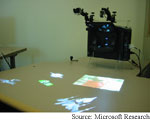|
NEWS
|

|
 |
Portable
augmented reality
Computer monitors are by no means an endangered species,
but it is becoming increasingly apparent that they will
soon be replaced for many uses by floors, walls and table
tops...
|
Bacteria
simplifies fuel cells
Most fuel cells run on hydrogen that the cells first extract
from hydrocarbons like fossil fuels and plant matter.
The extraction process, however, also produces carbon
monoxide, which inhibits the chemical reaction that fuel
cells use to generate electricity...
|
Nano
error correction
Molecular-scale manufacturing promises extremely small,
fast, cheap devices like computers. Molecular-scale fabrication
processes tend to involve chemistry and biology, which
are usually simple and inexpensive to carry out, but also
error-prone...
|
Addressing
nanowire arrays
Smaller circuitry means smaller, faster, lower-power computers.
One way to make smaller circuits is to use densely-packed
nanowires, which can be as small as a few millionths of
a millimeter. A big challenge in developing nanoelectronics
is connecting molecular-scale circuits...
|
Bits
and pieces
Color
e-paper, all-optical memory chips and all-inorganic nanocrystal
solar cells. |
FEATURES
|
View
from the High Ground: USC's Michael Arbib
Computing matter, the action-perception
cycle, imagining tea with grandmother, passionate robots,
transferring brain settings, the Mirror System Hypothesis,
Hurricane Katrina, universal health care, and Goethe.
|
How
It Works: Data storage technologies
There are many possibilities for next generation
data storage: very large, extraordinary and ballistic
magnetoresistance; MEMS; near-field optics; holograms
and molecular switches. |
|
 |
News RSS feed 
Blog RSS feed 
Bookshelf RSS feed

New: TRN's
Internet Services
TRN's Jobs Center
|
| |
|
| |
"If
we consider the fate of New Orleans with Hurricane
Katrina, we can certainly see challenges for technology
in terms of better design and maintenance of levees,
or in communication systems, but we also see the
fruits of pork-barrel politics, lack of planning
and coordination (technology can help, but one needs
bright dedicated people to make use of it), and
acceptance of a status quo in which too many people
live in poverty."
- Michael Arbib, University of Southern California |
|
| |
|
| |
Thanks
to Kevin from
GoldBamboo.com
for technical support |
|

